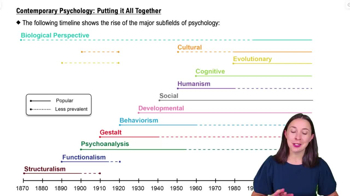Table of contents
- 1. Introduction to Psychology1h 43m
- 2. Psychology Research2h 20m
- 3. Biological Psychology2h 41m
- 4. Sensation and Perception28m
- 5. Consciousness and Sleep32m
- 6. Learning41m
- 7. Memory34m
- 8. Cognition37m
- 9. Emotion and Motivation35m
- 10. Developmental Psychology33m
- 11. Personality48m
- 12. Social Psychology41m
- 13. Stress and Health41m
- 14. Psychological Disorders44m
- 15. Treatment47m
1. Introduction to Psychology
Contemporary Psychology: Putting it All Together
Struggling with Psychology?
Join thousands of students who trust us to help them ace their exams!Watch the first videoMultiple Choice
Biopsychology has found clear evidence of a biological cause for
A
schizophrenia.
B
bulimia nervosa.
C
phobias.
D
repression.
 Verified step by step guidance
Verified step by step guidance1
Understand the context of biopsychology, which studies the biological underpinnings of behavior and mental processes.
Identify the mental disorders listed: schizophrenia, bulimia nervosa, phobias, and repression.
Research the biological causes associated with each disorder. For example, schizophrenia has been linked to genetic factors, neurotransmitter imbalances, and brain structure abnormalities.
Compare the strength of biological evidence for each disorder. Schizophrenia is well-documented in biopsychology for having a strong biological basis.
Conclude that among the options, schizophrenia is the disorder with the most clear and established biological cause according to biopsychological research.

 4:54m
4:54mWatch next
Master Contemporary Psychology with a bite sized video explanation from Hannah Gordils
Start learningRelated Videos
Related Practice




















